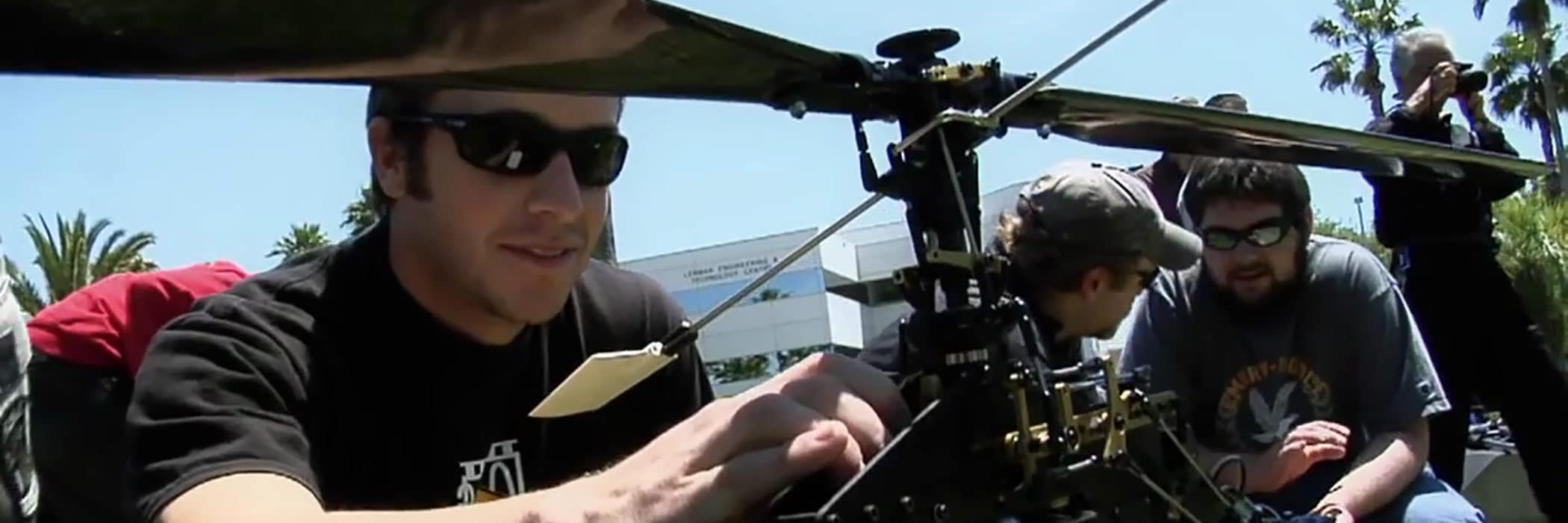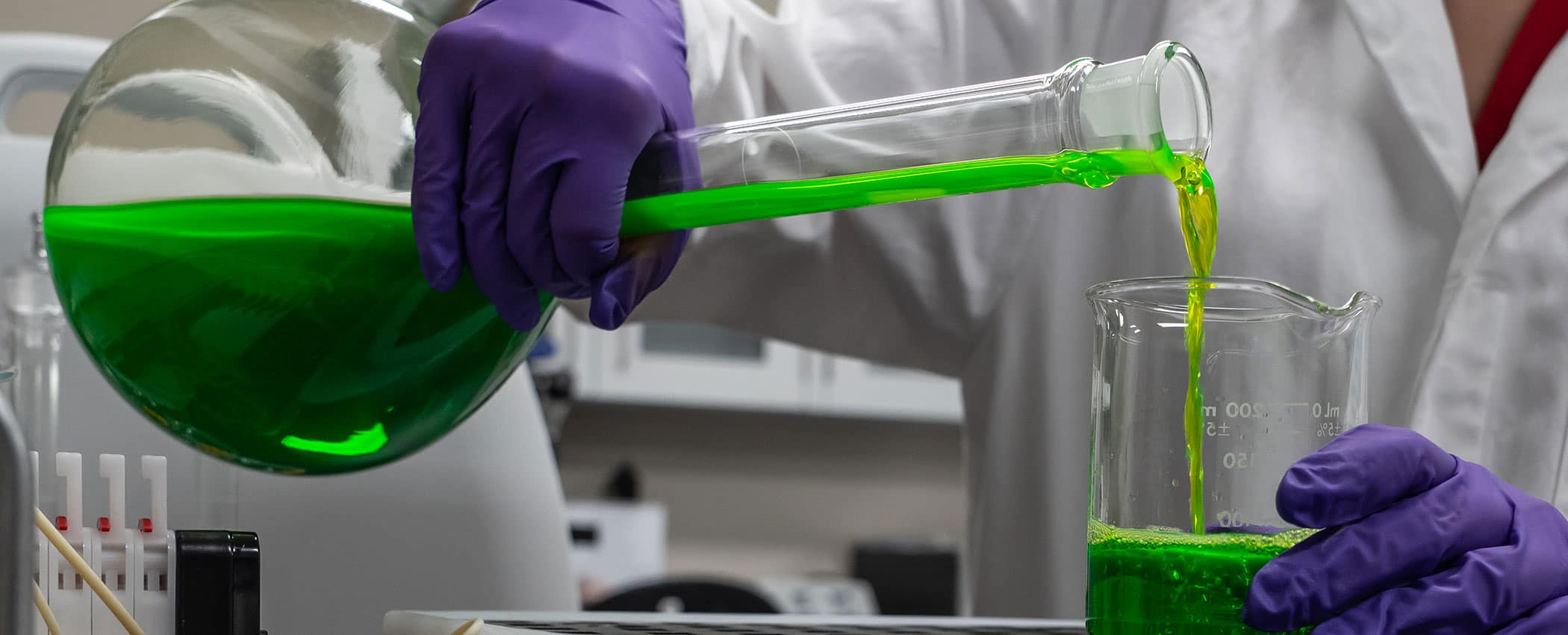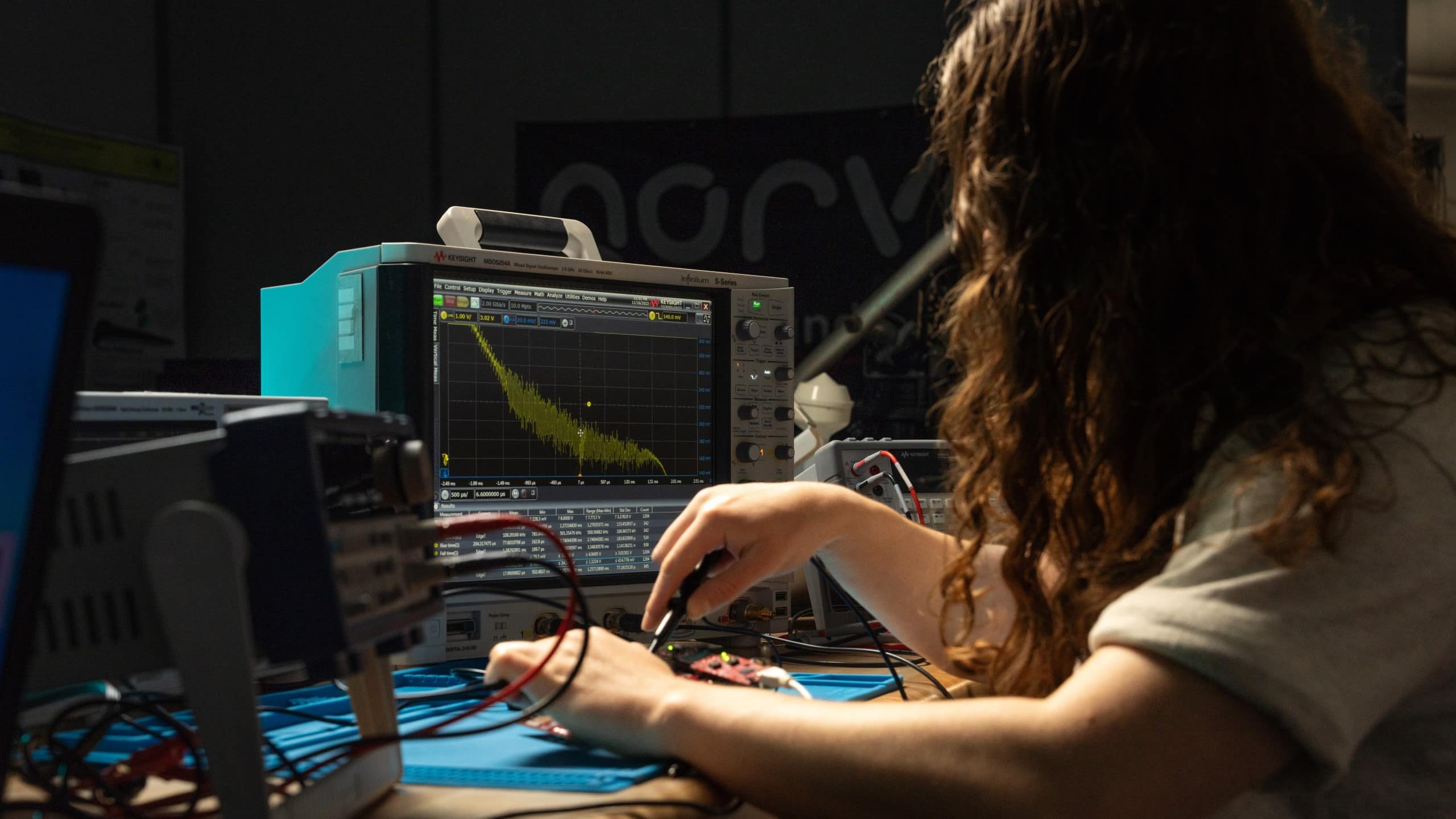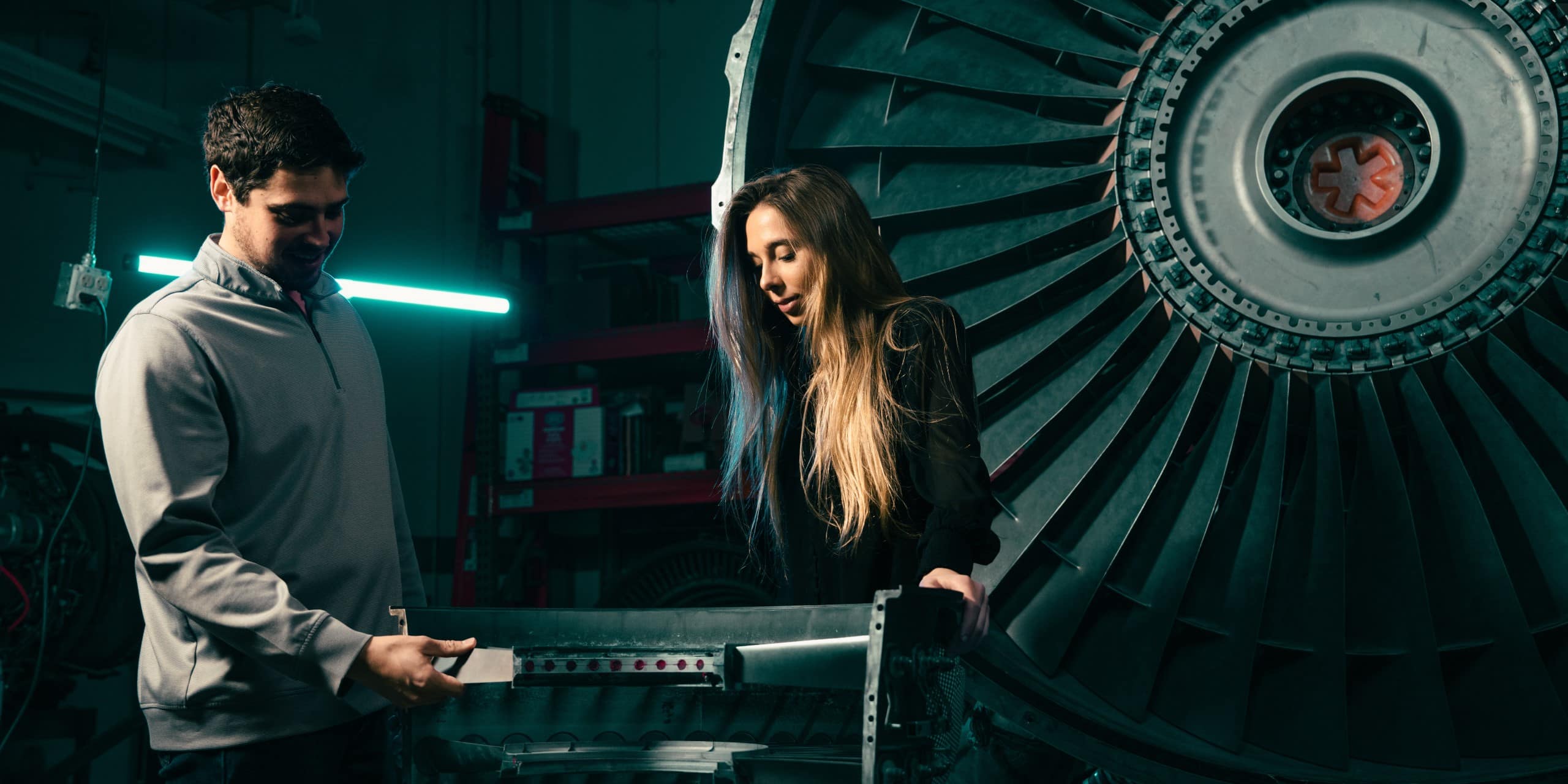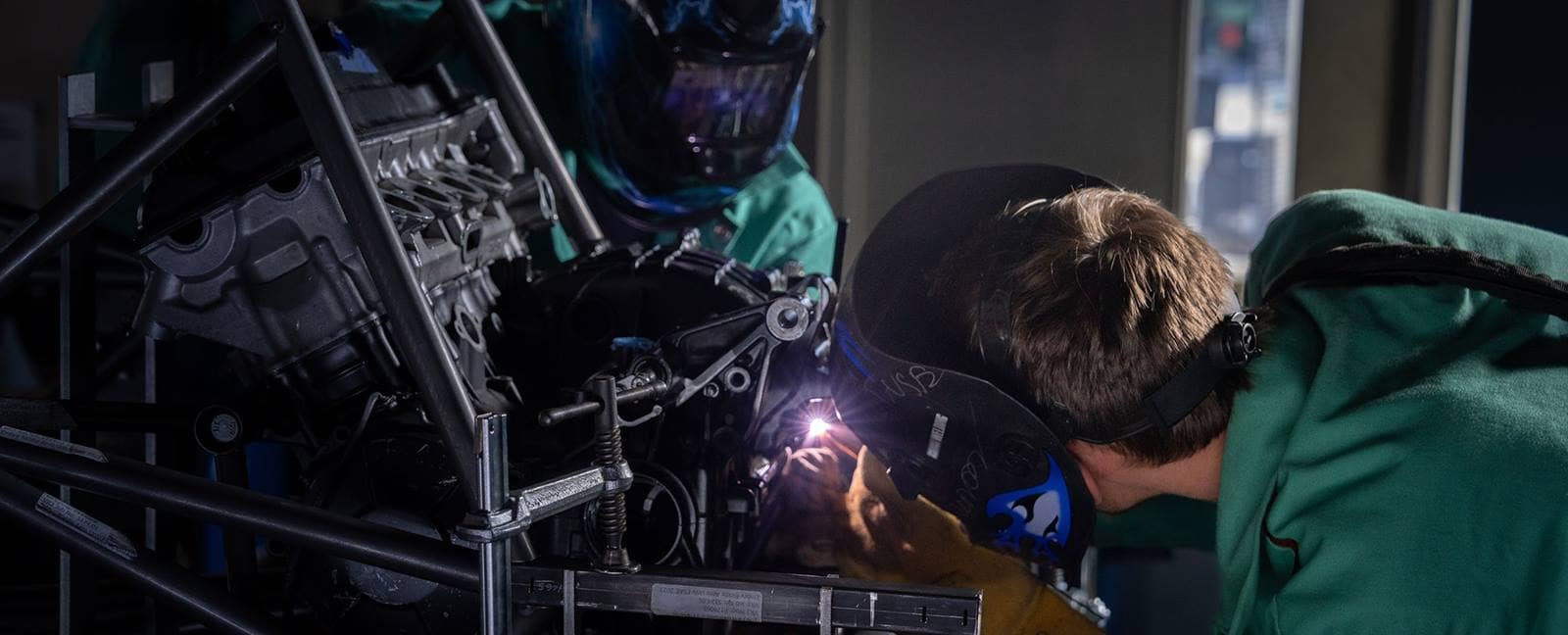
Bachelor of Science in
Mechanical Engineering
The Bachelor of Science in Mechanical Engineering provides students with practical experience to succeed as engineers and innovators in mechanical systems.
About the Bachelor of Science in Mechanical Engineering
The Bachelor of Science in Mechanical Engineering at Embry‑Riddle prepares graduates for a wide variety of engineering careers in fields such as aerospace, robotics, energy, automotive, biomedical and manufacturing. There will always be a demand for those who can maintain, improve, adapt and redesign mechanical systems, which makes this the broadest field in engineering.
Pursuing a Mechanical Engineering degree at Embry‑Riddle provides access to state-of-the-art labs designed for use in undergraduate education and student-centered research. Embry‑Riddle students benefit from small class sizes, personal instruction from highly qualified faculty and hands-on engineering project opportunities.
Program Educational Objectives
- Demonstrate achievements in their chosen profession
- Contribute to the profession and the university
- Demonstrate professional preparation
- Exhibit professional ethics and integrity
Student Learning Outcomes
What you will learn while studying in the mechanical engineering program:
- Identify, formulate and solve complex engineering problems by applying principles of engineering, science and mathematics
- Apply engineering design to produce solutions that meet specified needs with consideration of public health, safety and welfare, as well as global, cultural, social, environmental and economic factors
- Communicate effectively with a range of audiences
- Recognize ethical and professional responsibilities in engineering situations and make informed judgments, which must consider the impact of engineering solutions in global, economic, environmental and societal contexts
- Function effectively on a team whose members together provide leadership, create a collaborative and inclusive environment, establish goals, plan tasks and meet objectives
- Develop and conduct appropriate experimentation, analyze and interpret data and use engineering judgment to draw conclusions
- Acquire and apply new knowledge as needed, using appropriate learning strategies
Mechanical Engineering Career Opportunities
Careers and Employers
Setting the standard, Embry-Riddle graduates tend to secure roles in mechanical engineering, product design, mechanical systems and design engineering, with a placement rate of 97.4% within a year of graduation.
Graduates with a mechanical engineering degree often enter the industry through top companies such as:
- NASA
- General Motors
- Raytheon
- Lockheed Martin
- The Boeing Company
- Collins Aerospace
- Pratt & Miller Engineering
- General Electric
Mechanical Engineering Salary Information
According to a recent report from the U.S. Bureau of Labor Statistics, the median annual salary for mechanical engineers is $95,300.
DETAILS
About Mechanical Engineering at the Daytona Beach, FL Campus
Part of the Department of Mechanical Engineering within the College of Engineering, the Mechanical Engineering degree provides a strong foundation in mechanical systems. With access to state-of-the-art engineering labs and extensive hands-on experience, students graduate with the tools they need to succeed as engineers and innovators in one of the most in-demand career fields.
The Department of Mechanical Engineering offers an accelerated degree program that allows well-qualified students the chance to begin their graduate work for the Master of Science in Mechanical Engineering, while finishing their Bachelor of Science in Mechanical Engineering at Embry‑Riddle.
Tracks/Specialties and/or Certificates
Students pursuing a mechanical engineering degree must complete one of four different tracks:
- Biomedical Systems: focuses on fundamental principles and technological innovation in the bioengineering and biomedical fields
- Energy Systems: focuses on renewable energy with specific emphasis on kinetic energy systems and thermal energy systems
- High-Performance Vehicles: focuses on vehicle design and manufacturing, from competition vehicles to fuel-efficient and environmentally friendly vehicles
- Robotics and Autonomous Systems: focuses on the robotics and autonomous vehicles
Mechanical Engineering Information
- Credits: 129
- Online or In-Person: In-Person
Professional Accreditation
The Mechanical Engineering program is accredited by the Engineering Accreditation Commission of ABET, www.abet.org, under the General Criteria and the Mechanical Engineering Program Criteria.
Helpful Links
- Tour Our Daytona Beach Campus
- Discover the Department's Faculty
- Explore the Fields of Study: Engineering
- Find Related Clubs & Organizations
General Education Requirements
For a full description of Embry-Riddle General Education guidelines, please see the General Education section of this catalog. These minimum requirements are applicable to all degree programs.
| Communication Theory & Skills (COM 122, COM 219, COM 221) | 9 | |
| Lower-Level Humanities * | 3 | |
| Lower-Level Social Sciences (EC 225 required) | 3 | |
| Lower or Upper-Level Humanities or Social Sciences * | 3 | |
| Upper-Level Humanities or Social Sciences * | 3 | |
| Computer Science (EGR 115) | 3 | |
| Mathematics (MA 241 & MA 242) | 8 | |
| Physical and Life Sciences - (PS 150, PS 160 & PS 253) | 7 | |
| Total Credits | 39 | |
| UNIV 101 | College Success | 1 |
| Mathematics | ||
| MA 243 | Calculus and Analytical Geometry III | 4 |
| MA 345 | Differential Equations and Matrix Methods | 4 |
| Physical Science | ||
| CHM 110 | General Chemistry I | 3 |
| CHM 110L | General Chemistry I Laboratory | 1 |
| PS 250 | Physics for Engineers III | 3 |
| Engineering Sciences Core | ||
| EE 327 | Electrical Engineering Fundamentals | 3 |
| EGR 101 | Introduction to Engineering | 2 |
| EGR 120 | Graphical Communications | 3 |
| ES 201 | Statics | 3 |
| ES 202 | Solid Mechanics | 3 |
| ES 204 | Dynamics | 3 |
| ES 305 | Thermodynamics | 3 |
| ES 309 | Fluid Dynamics | 3 |
| ES 320 | Engineering Materials Science | 2 |
| ES 321 | Engineering Materials Science Laboratory | 1 |
| ES 403 | Heat Transfer | 3 |
| Mechanical Engineering Core | ||
| ME 208 | Manufacturing Laboratory | 1 |
| ME 325 | Modeling and Simulation of Complex Engineering Problems | 2 |
| ME 326 | Modeling and Simulation of Complex Engineering Problems Lab | 1 |
| ME 304 | Introduction to Machine Design | 3 |
| ME 313 | Instrumentation and Data Acquisition | 2 |
| ME 314 | Instrumentation and Data Acquisition Laboratory | 1 |
| ME 400 | Vibration and Acoustics | 3 |
| ME 436 | Advanced Machine Design | 3 |
| ME 438 | Model-Based Control System Design | 2 |
| ME 438L | Model-Based Control System Design Laboratory | 1 |
| Professional Development Elective *** | 3 | |
| Technical Elective **** | 6 | |
| Total Credits | 73 | |
- ***
CEME 396 or AF 402/MSL 402/NSC 402 or ME 540 will satisfy this requirement.
- ****
- There are a number of 300-500 level courses from other departments that are equivalent to existing required courses in the BSME curriculum and therefore cannot be used as Technical Electives. Please consult with the BSME Program Coordinator or Academic Advisor before enrolling in any Technical Elective course to make sure it will apply to your BSME program of study.
Biomedical Systems Track Courses*
| ME 320 | Fundamentals of Biomechanics | 3 |
| ME 442 | Biofluid Mechanics | 3 |
| ME 460 | Biosolid Mechanics | 3 |
| ME 448 | Preliminary Design in Biomedical Systems | 4 |
| ME 458 | Senior Design in Biomedical Systems | 4 |
| Total Credits | 17 | |
- *
Students may also select from the following courses as upper level technical electives: CHM 310/CHM 310L, HF 312, HF 326, HF 440, BIO 305/BIO 305L, BIO 306/BIO 306L, BIO 405/405L, or BIO 440
Energy Systems Track Courses
| ME 316 | Thermodynamics II | 3 |
| ME 443 | Heating, Ventilation, and Air-Conditioning | 3 |
| ME 445 | Sustainable Design | 3 |
| ME 414 | Preliminary Design for Energy Systems | 4 |
| ME 434 | Senior Design for Energy Systems | 4 |
| Total Credits | 17 | |
High Performance Vehicles Track Courses
| ME 303 | Longitudinal and Vertical Vehicle Dynamics | 3 |
| ME 409 | Vehicle Aerodynamics | 3 |
| ME 413 | Preliminary Design for High Performance Vehicles with Laboratory | 4 |
| ME 433 | Senior Design for High Performance Vehicles with Laboratory | 4 |
| ME 439 | Combined Vehicle Dynamics | 3 |
| Total Credits | 17 | |
Robotics and Autonomous Systems Track Courses
| ME 311 | Robotics Technologies for Unmanned Systems | 3 |
| ME 402 | Robotic Arms | 3 |
| ME 404 | Mechatronics | 3 |
| ME 407 | Preliminary Design for Robotic Systems with Laboratory | 4 |
| ME 437 | Senior Design for Robotic Systems with Laboratory | 4 |
| Total Credits | 17 | |
| Total Degree Credits | 129 | |
Suggested Plan of Study
Students should be aware that several courses in each academic year may have prerequisites and/or corequisites. Please check the course descriptions at the back of this catalog before registering for classes to ensure requisite sequencing.
See the Common Year One outline in the Engineering Fundamentals Program Introduction.
| Year One | ||
|---|---|---|
| Credits | ||
| See the Common Year One outline in the College of Engineering introduction. | 33 | |
| Credits Subtotal | 33.0 | |
| Year Two | ||
| COM 221 | Technical Report Writing | 3 |
| ES 201 | Statics | 3 |
| ES 202 | Solid Mechanics | 3 |
| ES 204 | Dynamics | 3 |
| ME 208 | Manufacturing Laboratory | 1 |
| MA 243 | Calculus and Analytical Geometry III | 4 |
| MA 345 | Differential Equations and Matrix Methods | 4 |
| PS 160 | Physics for Engineers II | 3 |
| PS 250 | Physics for Engineers III | 3 |
| PS 253 | Physics Laboratory for Engineers | 1 |
| Social Science Lower Level Elective | 3 | |
| Credits Subtotal | 31.0 | |
| Year Three | ||
| EE 327 | Electrical Engineering Fundamentals | 3 |
| ES 305 | Thermodynamics | 3 |
| ES 309 | Fluid Dynamics | 3 |
| ES 320 | Engineering Materials Science | 2 |
| ES 321 | Engineering Materials Science Laboratory | 1 |
| ES 403 | Heat Transfer | 3 |
| ME 304 | Introduction to Machine Design | 3 |
| ME 313 | Instrumentation and Data Acquisition | 2 |
| ME 314 | Instrumentation and Data Acquisition Laboratory | 1 |
| ME 325 | Modeling and Simulation of Complex Engineering Problems | 2 |
| ME 326 | Modeling and Simulation of Complex Engineering Problems Lab | 1 |
| Professional Development Elective ** | 3 | |
| Track Course | 3 | |
| Track Course | 3 | |
| Credits Subtotal | 33.0 | |
| Year Four | ||
| EC 225 | Engineering Economics | 3 |
| ME 436 | Advanced Machine Design | 3 |
| ME 400 | Vibration and Acoustics | 3 |
| ME 438 | Model-Based Control System Design | 2 |
| ME 438L | Model-Based Control System Design Laboratory | 1 |
| Upper-Level Humanities or Social Science Elective | 3 | |
| Technical Elective AE/CEC/CIV/CS/EE/EGR/EP/ME/SE/SYS or Track specific electives *** | 6 | |
| Track Course | 3 | |
| Preliminary Design Course (ME 413 or ME 407 or ME 414 or ME 448) | 4 | |
| Senior Design Course (ME 433 or ME 437 or ME 434 or ME 458) | 4 | |
| Credits Subtotal | 32.0 | |
| Credits Total: | 129.0 | |
- **
CEME 396 or AF 402 / MSL 402 / NSC 402 or ME 540 will satisfy this requirement.
- ***
AF/NSC/MSL UL may fulfill 3 credits of technical electives. There are a number of 300-500 level courses from other departments that are equivalent to existing required courses in BSME curriculum and therefore cannot be used as Technical Electives. Please consult with the BSME Program Coordinator or Academic Advisor before enrolling in any Technical Elective course to make sure it will apply to your BSME program of study.
Get Started Now:
Summary
129 Credits
Estimate your tuition by using the Tuition Calculator
View Financial Aid Information
Learn about our General Education
Find out about transferring credits to this degree
Learn more about our Veterans & Military benefits
View our Academic Calendar
